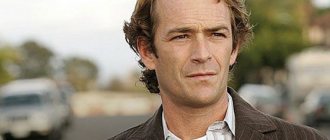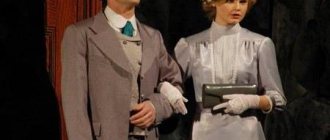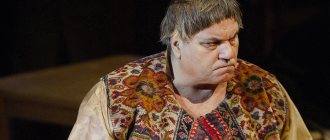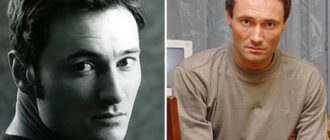This term has other meanings, see Cops (meanings).
| "Streets of Broken Lanterns " " Cops" | |
| Season 1 intro | |
| Genre | detective |
| Creator | Alexander Kapitsa |
| Cast |
|
| Composer | Andrey Sigle (seasons 1-2) Andrey Ivanov (from season 3) Mikhail Mokienko (season 6) Andrey Mitroshin (season 9), etc. |
| A country | Russia, Russia |
| Original language | Russian |
| Number of seasons | 16 |
| Number of episodes | 484 (list of episodes) |
| Production | |
| Producer | Alexander Kapitsa (seasons 1-6) Kirill Kapitsa (seasons 1-4) Alexander Ustinov (seasons 1-4) Olga Maneeva (seasons 3-4) Andrey Kamorin (seasons 5-6), etc. |
| Director | Alexander Rogozhkin (season 1) Vladimir Bortko (under the pseudonym Yan Khudokormov) (season 1) Viktor Buturlin (season 1) Iskander Khamraev (season 1) Dmitry Svetozarov (seasons 1-2) Vitaly Aksenov (seasons 1-2, 4) Andrey Chernykh (seasons) Ernest Yasan (seasons) Igor Moskvitin (seasons) Andrey Kravchuk (3 seasons) Vlad Furman (5 seasons) Viktor Tatarsky (seasons) Alexey Lebedev (seasons) Sergey Snezhkin (seasons), etc. |
| Screenwriter | Andrey Kivinov (season 1) Igor Ageev (season 2) |
| Operator | Alexander Ustinov (seasons 1–4) Ivan Bagaev (seasons 2–3) Timur Iskandarov (seasons 5–6) Alexey Solodov (present) |
| Filming location | Saint Petersburg |
| Timing | 42—61 min |
| Studio | Russian video film (1995-2000) New Russian series, Zebra-film, Dolphin Studio (2000-2001) New Russian series, Dolphin Studio (2001-2006) New Russian series, Zebra Studio (2006-2008) Forward-Film, Graffiti Film Production (2008-2011) Forward-Film, Navigator (2011-2014) Forward-Film, Progress Studio (2015-present) |
| Broadcast | |
| TV channel | TNT January 4, 1998-January 13, 2001 (1-3), ORT/Channel One October 4, 1998-April 8, 1999, February 16, 2004-July 28, 2005, May 21-June 28, 2007, October 8-24, 2012 (1-5 ) NTV October 11, 1999-December 22, 2017 (1-16) STS August 2, 2003-September 23, 2006 (1-5) September 7, 2016-December 29, 2020 (1-4) |
| On the screens | January 4, 1998 – present |
| Video format | 16:9 (season 1–5, from season 14) 4:3 (season 6–13) |
| Links | |
| IMDb | ID 0192936 |
«Streets of broken lamps
"("
Cops
") is a Russian detective television series that first appeared on television in 1998. The first (pilot) episodes were filmed in 1995. The series has 16 seasons. It tells about the everyday life of police officers, later the police. Each episode is a separate detective investigation. At the moment, it is the longest running (in terms of time on air, but not in terms of the number of episodes) series in the history of Russian television.
Story
The first 8 episodes were filmed in 1995 based on the works of Andrei Kivinov, who then worked in the department for solving premeditated murders of the Kirovsky District Department of Internal Affairs of St. Petersburg. The customer for the television series was initially the RTR television channel, but the new management, who came to the channel in the spring of 1996, refused to show it due to the low quality of image and sound[1][2], as well as due to the channel’s debts for dubbing the American series “Santa Barbara” » before [3].
In 1997, Pavel Korchagin and Sergei Skvortsov, who left RTR, together with media manager Vladimir Gusinsky, decided to buy the broadcast rights from the second button, as well as cassettes with the first episodes for showing the series on the TNT channel[4], where on January 4, 1998 the series premiered and took place[1].
The first season of the series in the fall-winter of 1998 was also shown on ORT in prime time due to the fact that ORT general producer Konstantin Ernst appreciated the success of the series on TNT[3]. “Cops” in its premiere on ORT had a rating of 15% with a share of 35% of TV viewers[5].
Andrei Kivinov remained the screenwriter of the first season (32 episodes) until 1999, but continued to consult[6][7][8].
Since 1999, the series has been broadcast by the NTV channel[9] - both new episodes and reruns of old ones (seasons 7-12). From May 2001 to January 2002, due to changes in management at NTV, reruns of old episodes and premieres of a number of new ones were aired on the TV-6 channel[10][11]. After the channel was closed, the series returned to NTV[12].
Evgeny Kiselev recalled:
“...back in 1997, there was simply no such thing as Russian TV series on most TV channels. And Gusinsky did not believe that the domestic product could compete with American TV series like “Emergency” or “Cool Walker,” which were then shown on NTV season after season. He agreed to finance the production of the first season of Streets of Broken Lights. But on the condition that NTV will not take risks, and the rights to the premiere screening of the series will be sold to ORT. When the series was recognized as the main event of the television year, Gusinsky, as soon as he knew how to do this, turned 180 degrees and in a matter of weeks began to develop his own film production.”[13].
Also in 2004, 2005, 2007 and 2012, the first seasons of the series were repeated by Channel One. In February 2004, the same channel premiered the fifth season, the last with the participation of the old cast[14]. Reruns of old episodes also achieved high ratings, especially in 2004 and 2005[15][16].
“Turgenev’s heroine” and cabaret singer: roles in films
Klara Luchko as Natalya Dubko in Vsevolod Pudovkin’s feature film “The Return of Vasily Bortnikov” (1953)
Klara Luchko (center) as Dasha Shelest in Ivan Pyryev’s feature film “Kuban Cossacks” (1949)
Klara Lucko as Viola and Sebastian in Jan Fried's feature film Twelfth Night (1955)
In 1949, Ivan Pyryev decided to make a musical comedy about the competition between two Kuban collective farms. Dozens of applicants came to audition. The director invited Klara Luchko to audition personally. She recalled: “I didn’t hope for a big role, because Gerasimov considered me a “Turgenev heroine,” which he wrote down in my creative description at the end of the course. But why not try? The actress did not get the main role, but in the film she played Dasha Shelest, a worker at the Red Partisan collective farm. The film was released in Soviet theaters in 1950 under the title “Kuban Cossacks” and became very popular - more than 40 million people watched it at the box office. The Soviet press wrote positive reviews about the film, and Luchko’s heroine was called “a charming, lively collective farmer.” In 1951, for the role of Dasha Shelest, the artist was awarded the Stalin Prize of the second degree.
“My big life in cinema began with “Kuban Cossacks”. And this film accompanies me all my life, going through changing eras, through a series of moods of different leaders. He became not only part of my personal biography, but also a small part of the biography of my country. There is, perhaps, not a single person of the older or middle generation who has not seen the film, who has not known the songs that are still heard today, although the film was filmed more than half a century ago. <…> When the picture came out, I didn’t even imagine what would happen to me. On the radio every day they broadcast the songs “Oh, the viburnum is blooming...” and “As you were, so you remain...”. <…> And then the letters poured in. Thousands of viewers wrote to me, they watched the film many times and knew all the songs by heart.”
Klara Luchko, “Kuban Cossacks” (from the book “I am a Happy Man”)
The actress began to be often invited to films: in the early 1950s she starred in the films “Donetsk Miners” and “Hostile Whirlwinds”. She wrote about her role in the film “The Return of Vasily Bortnikov”: “Pudovkin invited me to play the role of the chief engineer of MTS. Of all the roles in the film, this was perhaps the worst. Inexpressive, sketchy, purely production <...> It was a shame that it was Pudovkin who had to play such a role. I didn’t feel any inner satisfaction, I suffered.” .
In 1955, Luchko played in the film Twelfth Night, directed by Jan Fried, based on the comedy of the same name by William Shakespeare. The actress got two main roles at once - brother and sister Viola and Sebastian. The film was one of the most popular in 1955.
Soon Luchko starred in the film “Red Leaves”. Initially, director Vladimir Korsh-Sablin invited the actress to play the fiancée of the revolutionary Metelsky, Stasya Yanovskaya. However, Luchko refused and asked to take her for the role of the cabaret singer Jadwiga. The artist wrote: “I can’t play Stasya. I've already played something like this. I’m unlikely to be able to create any other character, and there will only be a repetition of what has been done.” Korsh-Sablin did not immediately approve Luchko for the role of Jadwiga; he also considered her a “Turgenev heroine.” However, as a test, I decided to film a small scene with her in a restaurant. The actress convincingly played a cabaret artist and she was given this role. After the film’s release, viewers began sending letters of criticism to Luchko: “One of the strict viewers who responded to every film of mine wrote that he always considered me a serious and thoughtful actress. “How can we understand you now?” – he asked after the painting “Red Leaves”.
The following year, 1959, Klara Luchko played one of the main roles in the children's film “Snow Tale” by Eldar Shengelaya and Alexei Sakharov. In addition to the artist, the already well-known actors Evgeny Leonov and Zinaida Naryshkina played in the film, and the music for the film was written by Stalin Prize laureate Yuri Levitin. Initially, “The Snow Tale” was planned to be released not only in Soviet theaters, but also to be shown at major international festivals, including Cannes. However, the management of Mosfilm saw the film as a satire on Secretary General Nikita Khrushchev. The film was not only not nominated for awards, but was also limited in distribution.
In the 1960s, Luchko often acted, but mainly in episodes, films by novice directors, and appeared as a guest in television programs, including on “Blue Light.” Klara Luchko also worked at the Film Actor's Studio Theater - in the plays "Trouble from a Tender Heart", "Barbarians" and "Harsh Field".
Cast
- Petrenko Yuri Aleksandrovich, “Mukhomor” (Yuri Kuznetsov) - head of the police department in seasons 1-5
- Ershov Andrey Petrovich, “Grandfather” (Leonid Kuravlev) - head of the police department in seasons 6-8
- Solovets Oleg Georgievich (Alexander Polovtsev) - head of the police department, head of the interdistrict police department, head of the homicide department
- Firsov Gennady Antonovich, “Kefirych” (Georgy Shtil) - head of the interdistrict police department in seasons 10-13
- Gradovikov Igor Sergeevich (Andrey Zibrov) - head of the interdistrict police department in seasons 13-15
Operational staff of the homicide department:
- Kazantsev Vladimir Sergeevich “Casanova” (Alexander Lykov), seasons 1-2
- Larin Andrey Vasilievich (Alexey Nilov), seasons 1-5[17]
- Dukalis Anatoly Sergeevich (Sergey Selin), seasons 1-5
- Abdulova Anastasia Rurikovna (Anastasia Melnikova), seasons 1-5
- Volkov Vyacheslav Yurievich (Mikhail Trukhin), seasons 1-8; major from the homicide department in seasons 9-14
- Porokhnya Kirill Evgenievich (Oscar Kuchera), 6-8, 10, 11, 13, 14 seasons
- Dymov Nikolay Sergeevich (Evgeny Dyatlov), seasons 6-12
- Rydanov Andrey Vasilievich (Oleg Andreev), seasons 9-16
- Krymov Igor Viktorovich (Mikhail Luchko), seasons 12-16
- Savina Anna Valerievna (Veronica Norina), seasons 12-13
- Ushakova Olga Matveevna (Maria Valeshnaya), seasons 10-11
- Lapina Ekaterina Ivanovna (Yulia Shubareva), seasons 9-10
- Nicole Egorkina (Elena Vozhakina), season 13-14
- Margarita Potapenko (Elena Kuprashevich), seasons 14-16
- Scabies (Sergey Kravtsov) season 15
Replays
| This section is missing references to information sources. Information must be verifiable, otherwise it may be questioned and deleted. You may edit this article to include links to authoritative sources. This mark was set on May 7, 2020 . |
Russia
Over the years, the first seasons of the series were also repeated by the following TV channels:
- TNT (1999) - season 1
- STS (2003-2006) - seasons 1-5
- “Channel One” (2004-2005, 2007, 2012) - seasons 1-5
- “Russia” (2008-2009, 2014) - seasons 1-4[18]
- DTV (2009) - seasons 1-5
- REN TV (2010, 2017) — seasons 1–5
- “Channel 5” (2012, 2020, 2017-2018) - seasons 1-5
- "Russia-2" (2012-2013) - seasons 1-4
- (2016-2017) season 1-5
- World (2018) - Season 5
In 2011 and 2012, it was repeated for 5 seasons by the RTVi channel.
In 2013 and 2020, seasons 4 and 5 were shown by such film channels as “World of Series” and “Teleclub”.
Since 2020, the series has been repeated by the Russian Detective channel.
In 2020, the series (starting from season 6) is repeated by the Dom Kino TV channel. Since 2020, the series has been used for syndication on regional television channels (and episodes from all seasons are used, which has not been repeated on any television channel).
Belarus
From 2006 to 2020, the series aired on the NTV-Belarus channel.
Romania
From 2010 to 2020, the series was shown on the Romanian channel Romana Teverison.
Estonia
Shown since 2020, “TV6 Estonia Plus”.
Europe
In some countries it was and is shown: “NTV-Mir”, “RTVi”, “Teleclub”, “Doi Seriol”, “Mir Detektiva”, “TV 2”.
Ukraine
From 2006 to 2010 and from 2013 to 2014, eight seasons were shown by the Inter TV channel.
Also, NTN repeated seasons 4, 5, 6, 7 and 8 in 2014.
- Currently repeating the series: “House of Cinema”, “Russian Detective”.
Notes
- ↑ 12
THE SERIES “STREETS OF BROKEN LAMPS” IS 15 YEARS OLD. World of News (December 27, 2013). - Shock five-year plan of the domestic series. Session (December 2004).
- ↑ 1 2 Natalia Rostova.
Sergei Skvortsov: “When Hervey invited us to work, he said that two things were needed: clean toilets and salaries on time.” Republic (February 8, 2010). Retrieved June 7, 2020. - A story about how Pavel Korchagin and Sergei Skvortsov saved “Cops”.
- Killer rating. Kommersant (March 21, 2000).
- The Capercaillie is still flying. The series “Streets of Broken Lanterns” is 20 years old.. Arguments and Facts, St. Petersburg (November 9, 2015). Retrieved November 4, 2020.
- Andrey Kivinov: “A real operative, like a real actor, is distinguished by a creative approach to business” (interview). www.interessant.ru (12/15/2016). Retrieved November 4, 2020.
- Fedor Razzakov.
The roles of bandits were played by... bandits // The brilliance and poverty of Russian TV. Secrets of television: from Yeltsin to Medvedev 1992-2008. - Litres, 2020. - pp. 478-482. — 927 p. — ISBN 9785425098535. - Cops and bros of our TV. RIA Novosti
(November 16, 2010). - “Cops” will come to TV-6 on Saturday // KP.RU
- Where should the poor “Cops” go now? Komsomolskaya Pravda (January 23, 2002).
- FOLLOWING “TIME”. Labor (August 7, 2003).
- TV stars: Evgeny Kiselev. Interview with the former host of the “Itogi” program. Meduza (February 8, 2016).
- Channel One begins showing the film “Streets of Broken Lanterns-5”. Channel One (February 16, 2004).
- TV channels fight in pairs. Izvestia (January 14, 2005).
- TV leaders with Arina Kommersant-Borodina. Kommersant (October 20, 2004).
- “Cops” Larin and Dukalis: they ordered our murder! — KP July 24, 2003
- “Streets of Broken Lanterns” on the website of the TV channel “Russia-1”.
- ↑ 12
What is the TNT television network: “Street of Broken Lanterns”, Topic of the day, Newsru.com (April 17, 2001). Retrieved November 4, 2020.
“People still thank me for this role.”
Clara Luchko. 1950s Moscow. Photo: Evgeny Umnov / Multimedia art museum, Moscow
Klara Luchko (left) as Klavdia Pukhlyakova in the feature film “The Return of Budulai” by Alexander Blank (1985)
Klara Luchko as Ksenia in the feature film “Dacha” by Konstantin Voinov, 1973. Photo courtesy of the Mosfilm film concern.
In the late 1960s, Klara Luchko almost stopped being invited to the movies. Her only role during this period was a cameo in the 1969 New Year's television concert film Abduction.
In the 1970s, Luchko starred in films about the Great Patriotic War and Revolution: “Peace to the Huts, War to the Palaces,” “Sea on Fire,” and the comedies “Dacha” and “Guardian.” She wrote: “I didn’t play much of what I wanted to play. I didn’t have <…> any patronage in cinema. But nevertheless, I have more than 60 roles" .
Popularity returned to the actress after the release of the four-part film “Gypsy” directed by Alexander Blank based on the novel by Anatoly Kalinin. It was he who invited Luchko to play the main role - Klavdia Pukhlyakova. The writer remembered her back at the Film Actor Studio Theater, where she played in the play based on his work “The Harsh Field.” Klara Luchko said: “When we discussed with the director who to invite for the role of Claudia, Anatoly Kalinin firmly said that he only sees Luchko.” The actress personally found the actor for the role of the gypsy Budulai Romanov. When the director could not find a suitable candidate for a long time, Luchko invited her friend, Moldovan actor Mihai Volontir, with whom she starred in the film “The Root of Life” in 1977, to audition. "Gypsy" was released and became popular. A few years later, Alexander Blank filmed a sequel to the film called “The Return of Budulai.”
“No matter who I play, no matter where I perform, they still remember Claudia from “Gypsy.” People still thank me for this role. For that great love, for the purity of feelings, for kind motherhood, for self-sacrifice. That is, for such wonderful qualities that should be inherent in every woman, every mother.”
Klara Luchko, “Am I to blame...” (from the book “I am a happy person”)











